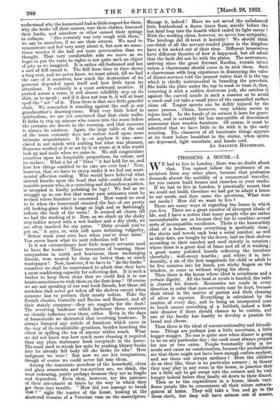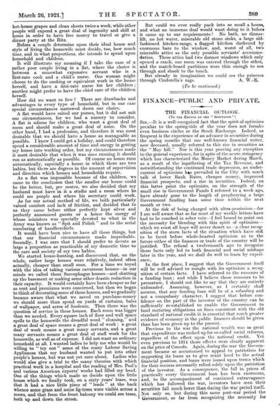CHOOSING A HOUSE. — L W E had to live in London ;
there was no doubt about that. You cannot follow the profession of an architect from any other place, because that profession demands almost the mobility of a commercial traveller, for you cannot build houses and churches in your studio.
If we had to live in London, it practically meant that _we could not build, therefore we had got to adapt a house to our needs, and then came the questions, What were our needs How did we want to live 1 There are many ways of regarding the house in which you live. There are a great number of divergent ideals of life, and I have a notion that many people who are rather uncomfortable are so because they try to combine several sorts of incompatible excellence. There is the housewifely ideal of a house, where everything is spotlessly clean ; the sheets and towels each bear a serial number, as well as their date, are bought by the dozen, laid on their shelves according to their number and used strictly in rotation ; where there is a great deal of brass and all of it winking a great many polished boards reflecting the furniture cheerfully ; well-swept hearths ; and where it is, inci- dentally, a sin of the first magnitude for child or adult to be five minutes late for lunch, put sticky fingers on the window, or come in without wiping his shoes.
Then there is the house whose ideal is seemliness and a certain dignity. All the food at meals is handed, the table is cleared for dessert. Economies are made in every direction in order that men-servants may be kept, because their ritual in the matter of parties and their cleaning of silver is superior. Everything is calculated by the routine of every day, and to bring an unexpected man to lunch causes something of a hubbub, indeed a first- rate disaster if there should chance to be cutlets, and one of the family has hastily to develop a passion for bread and cheese.
Then there is the ideal of unconventionality and friendli- ness. Things are perhaps just a little uncertain, a little hugger mugger. No one is quite sure when dinner is going to be on any particular day ; the cook must always prepare for one or two extra. People constantly drop in for meals and cause no consternation, because the probabilities are that there might not have been enough cutlets anyhow, and are there not always sardines ? Here the children do as they like, there is no particular nursery ; in theory they may play in any room in the house, in practice they are a little apt to get swept into the corners and be very hungry indeed before they finally sit down to their dinner. Then as to the expenditure in a house, ideals vary. Some people like to concentrate all their minor extrava- gances at home. They will take a 'bus and go to the dress circle, but they will have salmon out of season, hot-house grapes and clean sheets twice a week, while other people will expend a great deal of ingenuity and skill at home in . order to have free money to travel or give a dinner party at the Ritz.
Before a couple determine upon their ideal house and style of living the housewife must decide, too, how much time, and in what proportions, she intends to spend upon household. and children.
It will illustrate my _meaning if I take the case of a rather poor couple living in a flat, where the choice is between a somewhat expensive servant who is a hrst-rate cook and a child's nurse. One woman might choose to do the cooking or equivalent work in the house herself, and have a first-rate nurse for her children ; another might prefer to have the chief care of the children herself.
How did we want to live ? There are drawbacks and advantages in every type of household, but in our case special circumstances narrowed down our choice. A flat would have suited our purses, but it did not suit our circumstances, for we had a nursery to consider. A flat is odious for children, who want a great deal of room and should make a great deal of noise. On the other hand, I had a profession, and therefore it was most desirable that we should have a house as manageable as possible. I knew I could get a holiday, and could therefore spend a considerable amount of time and energy in getting my house into working order, but my circumstances made it most desirable that when it was once running it should run as automatically as possible. Of course no house runs automatically, especially a house in which there are two babies, but there are degrees in the amount of supervision and direction which houses and households require.
As a fiat was impossible because of the children, we came to the conclusion that the smaller our house could be the better, but, per contra, we also decided that my husband must have in it a studio and a room where he could see people and where his secretary could work. As for our actual method of life, we both particularly valued comfort and lack of friction, and decided that to us they came' before either perfectly kept silver and perfectly announced guests or a house the energy of whose ministers was specially devoted to what in the Army was known as " Spit and Polish " and to the serial numbering of handkerchiefs. It would have been nice to have all these things, but that our financial circumstances made improbable. Secondly, I was sure that I should prefer to devote as large a proportion as practicable of my domestic time to the care and society of my two babies. We started house-hunting, and discovered that, on the whole, rather large houses were relatively, indeed often actually, cheaper than small ones. For a time we toyed with the idea of taking various cavernous houses—in our minds we called them Sarcophagus houses—and shutting up the basement or making some other drastic reduction in their capacity. It would certainly have been cheaper as far as rent and premiums were concerned, but then we began to think of decorating some of these houses, and we gradually became aware that what we saved on purchase-money we should more than spend on yards of curtains, bales of wallpaper, and acres of linoleum. Then there was the question of service in these houses. Each room was bigger than we needed. Every square inch of floor and wall space spells to the housewife the dreadful word " cleaning," and a great deal of space means a great deal of work : a great deal of work means a great many servants, and a great many servants means a great deal of staff work for the housewife, as well as of expense. I did not want an ordinary household at all. rwanted ladies to help me who would be willing to " try out " some of the many Labour Saving Appliances that my husband wanted to put into other people's houses, but was not yet sure about. Ladies who would also give a trial to the many theories with which practical work in a hospital and the reading of Mrs. Peel's and various American experts' works had filled my head. One of the things which made us decide upon the little house which we finally took, on a sixty years' lease, was that it had a nice little piece of " leads " at the back whence some grass and some fig-trees were visible across a mews, and that from the front balcony we could see trees, both up and down the street. But could we ever really pack into so small a house, and what an immense deal would want doing to it before it came up to our requirements ! No bath, no dinner- lift, no hot water, miserable old stone sinks, a large old- fashioned kitchen-range, a flagged kitchen darkened by enormous bars to the window, and, worst of all, two miserable attics as the only possible servants' accommo- dation. These attics had two dormer windows which only opened a crack, one room was entered through the other, and the match-board partitions were thin enough to see through and shook to the touch.
But already in imagination we could see the princess (To be continued.)



































 Previous page
Previous page